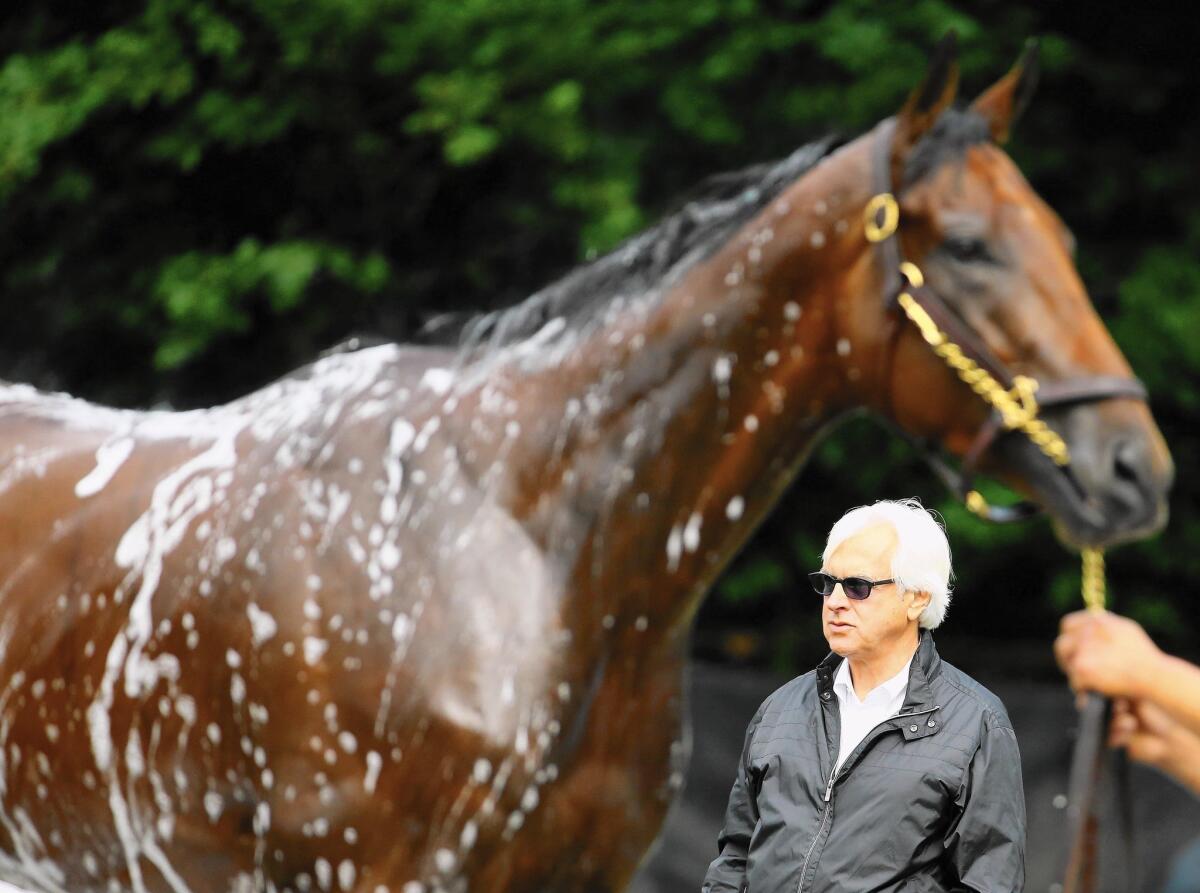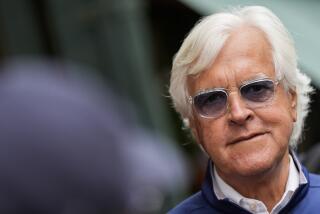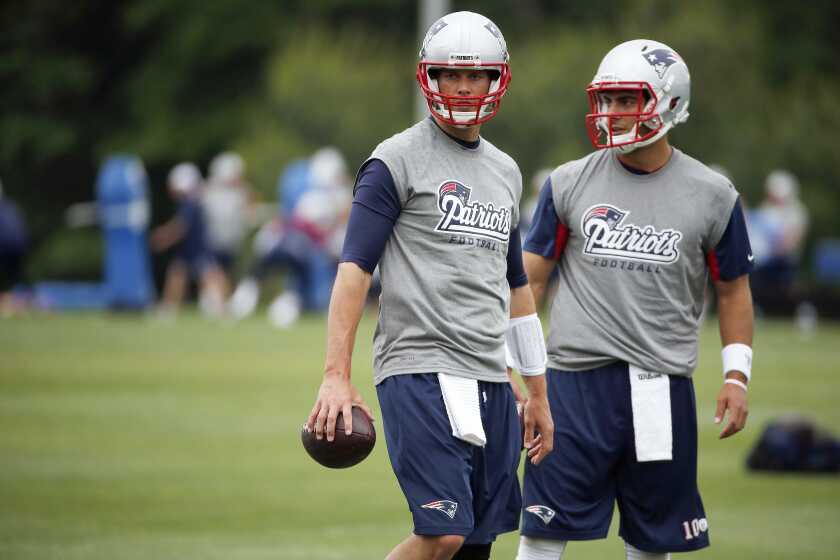Great Read: Bob Baffert has come a long way in horse racing

Bob Baffert looks on as American Pharoah gets bathed after training at Belmont Park this week.
It takes only a minute or so to walk from the racetrack at Santa Anita Park to the barns in back.
Through the parking lot and down a dirt path, the man with the shock of white hair and ostrich-skin cowboy boots waves at everyone who calls his name.
People want to shake his hand and congratulate him. They all say pretty much the same thing.
Just one more win.
Bob Baffert qualifies as a rock star in the world of thoroughbred horse racing, instantly recognizable by that hair and the dark sunglasses he wears, even on a cloudy morning.
The 62-year-old trainer has guided his latest star pupil, American Pharoah, to victories at the Kentucky Derby and Preakness Stakes. One more win — at the Belmont Stakes this Saturday — would secure the Triple Crown, a feat no horse has accomplished in almost four decades.
Baffert has been here before. Three times he has traveled to the Belmont with a shot at the crown only to fall short.
“It’s a different vibe for me this time,” he says. “I’m really enjoying it.”
His smile exudes confidence as he stops to chat with state officials and track workers, telling stories, getting a laugh or two.
As one of the winningest trainers in the history of the sport, Baffert has settled on an unexpected approach to the Belmont. He says: “I’m prepared to lose.”
::
The Baffert ranch, nestled close to the Mexican border, wasn’t anything special. The family kept cattle and enough chickens to supply eggs to restaurants in Nogales, Ariz. As Baffert says: “There was nothing racing about us.”
But then his father bought some inexpensive quarter horses, which are smaller than thoroughbreds and built for speed over shorter distances. Bill Baffert — everyone called him “The Chief” — plowed a dirt track into the oat hay field out back and 10-year-old Bob started riding each morning before school.
“It was just something he wanted to do,” Bill told The Times in 1998, four years before his death. “He was never afraid, but I was. I thought he might get hurt.”
The son became proficient enough over the next few years to earn $100 a day as a jockey in match races on the outskirts of town.
“Guys would gamble,” he says. “It was a ‘My horse is faster than your horse’ deal.”
Next came sanctioned races at local tracks, and Baffert earned his first victory in 1970 while still a teenager. He studied animal sciences at the University of Arizona, married a woman named Sherry and tried substitute teaching, all the while keeping one foot in the game.
That included working with quarter horses at a farm in nearby Prescott.
“I never learned from a real trainer so it was trial and error,” Baffert says. “Mostly error.”
His first winner as a trainer at Rillito Park in Tucson made only $330 from a $600 purse, but people took note of the 20-something newcomer with prematurely white hair and stark ambition. When several local trainers got caught doping horses, they asked him to run their stables until they returned from suspension.
“All of a sudden, I started winning races,” Baffert says. “I was the king of Arizona.”
::
Los Alamitos seemed like a logical next step.
The Orange County track, which ran only quarter horses in those days, had better races and bigger purses. Through the mid-1980s, Baffert worked his way up to become a top trainer.
It wasn’t simply experience — all those mornings on the family ranch — that fueled his success. He showed a keen eye for talent and an instinct for coaxing speed out of an animal.
“You want them to have fun,” he says. “If I don’t like the way a horse looks, if he has his ears pinned back, I’ll send him to the farm, let him go be a horse for a while.”
A prominent owner, fast-food magnate Mike Pegram, persuaded Baffert to try thoroughbreds, which seemed like another world. The horses could be temperamental. The people wore Rolexes and arrived at the track in fancy cars.
“I show up with my cowboy hat and pickup truck,” Baffert says. “I was scared to death.”
The new guy maintained a confident facade but also asked lots of questions, picking the brains of established trainers such as Charlie Whittingham, Laz Barrera and especially Wayne Lukas, who had also started with quarter horses. Baffert gave himself three years to make it or leave.
Thirty Slews, purchased for $30,000, won the prestigious Breeders’ Cup Sprint in 1992. Cavonnier nearly won the 1996 Kentucky Derby, falling short by a nose.
More victories translated into more owners knocking on the barn door, bringing good horses.
The late 1990s saw Baffert enter a torrid streak, as three of his proteges — Silver Charm, Real Quiet and War Emblem — doubled-up at the Kentucky Derby and Preakness. A small stable that used to earn less than $2 million a year now brought in six times as much.
Not that Baffert was unanimously popular. Call it self-assurance or ego, but his personality rubbed some people the wrong way.
“With a guy who’s won so many big races, you’ve got to respect him,” says Doug O’Neill, another Southern California trainer who guided I’ll Have Another to the first two-thirds of the Triple Crown in 2012. “But it’s a competitive thing.”
There were strained relations with jockeys Baffert hired and quickly replaced when they failed to produce. He says: “I can get mad and snap at people. If a horse loses, I’m moody.”
--
No one wins all the time. Certainly not in horse racing.
Even when Baffert was on a roll, he repeatedly came up short at the Belmont with Silver Charm losing by three-quarters of a length in 1997 and Real Quiet finishing second by a nose the following year.
“A nose,” Baffert says, wincing behind those sunglasses. “That was a brutal beat.”
About that time, his marriage to Sherry, with whom he had four children, was disintegrating and he was seen in the company of a younger woman, a Louisville television anchor named Jill Moss. That did not sit well with many in the conservative realm of horse racing.
Then came a string of unimpressive results at the Kentucky Derby through the mid-2000s. Critics wondered if his career was on the wane.
Maybe it was time to regroup. Baffert married Jill in 2002 and they had a son, Bode, named after the Olympic skier Bode Miller. The three were often seen together at the track as Baffert continued to pursue what he calls “this madness — I’m thinking horses 24-7.”
Mornings were spent at the track, watching his horses run and speaking by walkie-talkie to the riders, telling them how far to go and how hard to push. Back in the barn, he checked on nuances of appetite and behavior.
“I don’t think I could do his job,” says Victor Espinoza, the jockey who will ride American Pharoah on Saturday. “There are no days off.”
On a trip to the Dubai World Cup in 2012, Baffert suffered from what he thought was a bad case of indigestion. When the pain stretched past midnight, Jill got on the Internet to do some research.
Was he feeling nauseated, she asked. Did his left arm hurt?
“Oh my god, I’m having a heart attack,” he recalls telling her. “I thought I was toast.”
A rickety ambulance took him to the hospital, where doctors inserted three stents. The emergency surgery was a success, but more bad news awaited him back home.
Seven horses in his stable at Hollywood Park died mysteriously over the course of 16 months, prompting California officials to investigate. Though authorities cleared Baffert in late 2013, they noted that he regularly gave all of his horses a thyroid drug to enhance their strength.
It was a common practice at the time, but Baffert quickly backed off, saying: “The last thing in the world I want to be known as is a cheater.”
::
The office at his Santa Anita barn feels cramped and cluttered with a desk and a couch, and winner’s circle photos on the paneled walls. Flies zip through the still air.
It has been a long morning of pre-Belmont interviews, but Baffert keeps talking with all the alacrity that has made him a media favorite.
“I’ll tell you something,” says Baffert, who lives in La Cañada-Flintridge. “American Pharoah is special.”
The horse owned by Ahmed Zayat offered a glimpse of good things to come with an effortless win at the Arkansas Derby in April, prompting Jill to say, “I’d better get a dress.” For the Kentucky Derby, she meant.
If the subsequent victory at Churchill Downs seemed workmanlike — American Pharoah off his game — the Preakness was extraordinary, a dominating run in rain and mud. Baffert marveled at how the 3-year-old appeared to float, covering ground so easily.
“I’d like to take credit,” he says, “but Bode could probably train this horse.”
Still, completing the Triple Crown will be difficult.
The Belmont culminates a hard stretch of racing with a 1 1/2-mile distance that is longer than the Derby or the Preakness. Much of the field skipped one or both of the crown’s first two legs, so the competition will be rested.
Though American Pharoah is a heavy betting favorite, only 11 horses have managed to achieve one of sport’s most elusive feats, none since Affirmed in 1978, so Baffert is keeping his excitement in check. He says: “I’ve seen a lot of great horses get to this point and lose.”
It seems the journey from a Nogales ranch to the top of the thoroughbred scene has taught him important lessons about patience, and maybe even a touch of humility.
“I still make mistakes,” he says. “But I have a lot more patience.”
Twitter: @LATimesWharton
More to Read
Go beyond the scoreboard
Get the latest on L.A.'s teams in the daily Sports Report newsletter.
You may occasionally receive promotional content from the Los Angeles Times.











